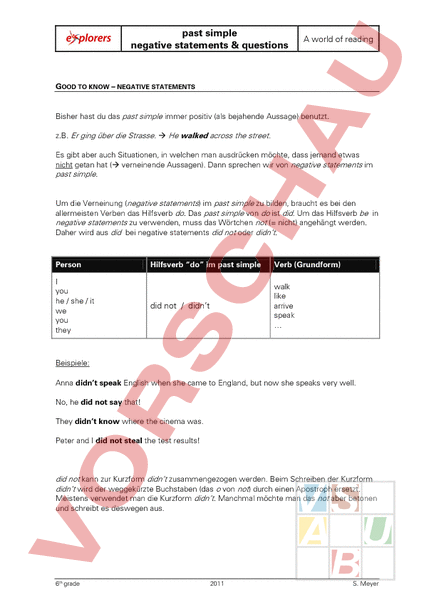Arbeitsblatt: Negative statements and questions in past simple
Material-Details
Merkblatt inkl. Übungen
Englisch
Grammatik
6. Schuljahr
4 Seiten
Statistik
82832
726
8
13.06.2011
Autor/in
st_meyer (Spitzname)
Land: Schweiz
Registriert vor 2006
Textauszüge aus dem Inhalt:
past simple negative statements questions world of reading GOOD TO KNOW – NEGATIVE STATEMENTS Bisher hast du das past simple immer positiv (als bejahende Aussage) benutzt. z.B. Er ging über die Strasse. He walked across the street. Es gibt aber auch Situationen, in welchen man ausdrücken möchte, dass jemand etwas nicht getan hat ( verneinende Aussagen). Dann sprechen wir von negative statements im past simple. Um die Verneinung (negative statements) im past simple zu bilden, braucht es bei den allermeisten Verben das Hilfsverb do. Das past simple von do ist did. Um das Hilfsverb be in negative statements zu verwenden, muss das Wörtchen not ( nicht) angehängt werden. Daher wird aus did bei negative statements did not oder didnt. Person you he she it we you they Hilfsverb do im past simple Verb (Grundform) did not didnt walk like arrive speak Beispiele: Anna didnt speak English when she came to England, but now she speaks very well. No, he did not say that! They didnt know where the cinema was. Peter and did not steal the test results! did not kann zur Kurzform didnt zusammengezogen werden. Beim Schreiben der Kurzform didnt wird der weggekürzte Buchstaben (das von not) durch einen Apostroph ersetzt. Meistens verwendet man die Kurzform didnt. Manchmal möchte man das not aber betonen und schreibt es deswegen aus. 6th grade 2011 S. Meyer GOOD TO KNOW – QUESTIONS Um Fragen im past simple zu formulieren brauchst du – wie bei den negative statements – das Hilfsverb do. Hilfsverb do im past simple Did Didnt Person Verb (Grundform) you he she it we you they walk like arrive speak ? Beispiele: Did Anna walk to school yesterday? Did you like Teletubbies when you were younger? Did Peter and Bob read lot of books last year? Didnt you say that you were in holidays? GOOD TO KNOW – EXEPTIONS Wie bei fast allem gibt es auch bei negative statements und questions im past simple einige Ausnahmen. Bei den beiden Verben be und can werden Frage und Verneinung im past simple nicht mit did gebildet! be positive negative I, he, she, it was I, he, she, it we, you, they were we, you, they question was not wasnt were not werent Was I, he, she, it ? Were we, you, they ? Beispiele: Was Sophie your friend in Kindergarten? We werent at home when you called yesterday. 6th grade 2011 S. Meyer can positive negative you he she it we you they you he she it we you they could question could not Could couldnt you he she it we you they ? Beispiele: Could Gianni speak German when he came to Switzerland? couldnt speak until was four years old! TASK 1 Formuliere mit dem vorgegebenen Verb und dem dazugehörigen Satzinhalt jeweils 1. eine Frage im past simple 2. eine positive (bejahende) Antwort im past simple 3. eine negative (verneinende) Antwort im past simple Beipiele: walk Mario to school yesterday Question: positive answer: negative answer: Did Mario walk to school yesterday? Yes, Mario walked to school yesterday. No, Mario didnt walk to school yesterday. like you the new James Bond movie Question: positive answer: negative answer: Did you like the new James Bond movie? Yes, liked the new James Bond movie. No, didnt like the new James Bond movie. can the young bird fly already Question: positive answer: negative answer: 6th grade Could the young bird fly already? Yes, the young bird could fly already. No, the young bird couldnt fly already. 2011 S. Meyer 1. arrive Sarah by train this morning Q. p. a. n. a. 2. like Peter the new Harry Potter movie Q. p. a. n. a. 3. kiss Tom and Mary in the park yesterday Q. p. a. n. a. 4. go you to school this morning Q. p. a. n. a. 5. see they the tiger in the zoo Q. p. a. n. a. 6th grade 2011 S. Meyer 6. sing Bligg his new song Q. p. a. n. a. 7. buy Ally a new t-shirt Q. p. a. n. a. 8. be Toby in school yesterday Q. p. a. n. a. 9. find Cloe her keys Q. p. a. n. a. 10. be they at home on Sunday Q. p. a. n. a. 6th grade 2011 S. Meyer 11. learn you (Plural) a lot in school today Q. p. a. n. a. 12. tell she a good story Q. p. a. n. a. 13. know Tim a lot of poems by heart Q. p. a. n. a. 14. take they a break from their hard work Q. p. a. n. a. 15. eat you the last biscuit Q. p. a. n. a. 6th grade 2011 S. Meyer
